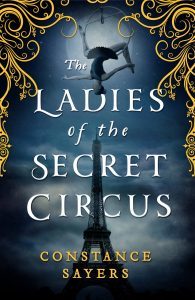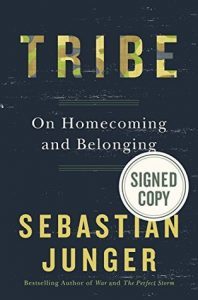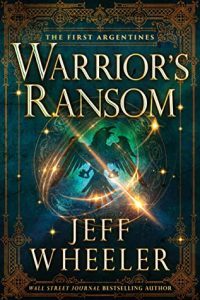C.A. Gray's Blog, page 37
September 2, 2021
Review of The Ladies of the Secret Circus

There is something intriguing and inherently magical about circuses, particularly in the 1920s.
The story follows Lara Barnes, opening on her wedding day to the boy whom she had loved all her life, even though he’d broken her heart a number of times. The intro was long and heart-tugging, so that you really felt her attachment… and thus her heartbreak when he appears to stand her up at the altar. His history of cheating on her makes it seem plausible that he really did just get cold feet… but the fact that he vanished without a trace, particularly leaving his car on the side of the road in the exact same place that an identical disappearance took place 30 years earlier, gives everyone pause.
Lara grieves, and eventually develops an emotional attachment to the town police chief Ben, in the process of the investigation. In time she becomes increasingly convinced that Todd didn’t leave her, but that something sinister happened to him. Add to this that there are hints throughout the early part of the story that both Lara and her mother, Audrey, have magical abilities–though Audrey frowns upon them and Lara uses them only for minor things due to Audrey’s discouragement. Audrey clearly has a secret that she’s not sharing. Lara also remembers meeting a strange man and a woman dressed in circus attire in childhood, and then runs into them again later on.
The story begins to unfold that the man is Alfa Kazur, one of the principle demons, who fathered a pair of twin girls, one of whom is Lara’s great grandmother. They were bound to a circus populated entirely by the damned, except for Alfa Kazur’s daughters, who were half human and who possessed great magic. Lara finds her great grandmother’s diaries which tell more about the dynamics of the family, and how this is related to Audrey’s secret. Through this, she learns what ultimately happened to Todd and to the other men who disappeared in the same place and in the same manner.
The supernatural becomes increasingly prominent as the story goes on, but in such a way that I didn’t find it jarring. I liked and identified with all of the characters I was supposed to. I did think some of the character motivations stretched belief from time to time, and some of the twists were a little too convenient. I knew I was in for a darker fantasy going in, but particularly in Lara’s great grandmother’s diaries, there was a lot of gratuitous sex. The whole book was also peppered with four letter words to the point where I nearly turned it off a number of times. I just persisted because it wasn’t constant, and I was just intrigued enough.
My rating: ***1/2
Language: significant
Violence: significant (and rather gruesome at the end)
Sexual content: significant and unnecessary
Political content: present but only in one place that I can recall
The post Review of The Ladies of the Secret Circus appeared first on C.A. Gray.
August 27, 2021
Review of Tribe

I’m having a hard time figuring out how to rate this book.
The concept behind it boils down to the idea that humans are happier when we’re forced (though hardship, usually) to band together and look after the needs of one another, rather than just our own. Examples include how early white settlers who were abducted and joined Native American tribes didn’t want to come back; how in the wake of Hurricane Katrina, survivors banded together to share their resources; and how the same occurred during the Blitz in WWII Britain. Consequently, mental health conditions (at least in the latter example, and after 9-11 as well) actually improved across the board, suicides decreased, and people generally counted themselves happier than they had been before tragedy struck. The point the author made wasn’t necessarily that it was the tragedy that made people rate their overall happiness levels higher, but the community.
I agree, of course–community and a sense of belonging is one of the fundamental building blocks for health which I can identify in my clinical practice, and the lack of it does tend to drive pathology in some cases (mental or otherwise). But I think the examples given, particularly given their intensity, misses something else fundamental: a sense of purpose, which Abraham Maslow considers the pinnacle of his “hierarchy of needs.” In a world where all our needs are generally provided for (well, used to be anyway–who knows where we’re currently headed), and where opportunities and options for how to spend our time are endless, I think many people struggle with a sense of aimlessness. In a crisis, opportunities shrink dramatically. Survival becomes paramount: both one’s own, and that of one’s fellow men. Suddenly the people in those situations found that someone else needed them, when perhaps they’d never had that feeling before. One of the fastest ways to forget about one’s own problems is to focus on helping someone else. Community is a byproduct of this: it’s natural to bond with those who serve us, and whom we serve. That’s kind of what a good church should be.
(Side note: I had family in New Orleans during Hurricane Katrina, who would dispute the author’s commentary on the social dynamic there at the time. I can’t comment on the other examples he gives, though.)
My rating: ***
Language: none that I can recall
Violence: none that I can recall
Sexual content: none
Political content: mild, and balanced
The post Review of Tribe appeared first on C.A. Gray.
The Guernsey Literary and Potato Peel Pie Society, by Shaffer and Barrows
Today’s podcast review comes from this blog review of The Guernsey Literary and Potato Peel Pie Society
The post The Guernsey Literary and Potato Peel Pie Society, by Shaffer and Barrows appeared first on C.A. Gray.
August 20, 2021
Review of A Voice in the Wind

Ugh. I loved this book (with a few minor annoyances throughout the text that I overlooked) until the very end, when I realized I knew exactly how it was going to end. And I thought, I’ve just invested HOURS in this?! (Spoiler alert: I really can’t review this book without giving away the end.)
The story takes place during the time of the first century church, seventy years after Jesus’ crucifixion and after the fall of Rome. The main character is Hadasseh, a Jewish slave girl raised a Christian, the daughter of the Widow of Nain’s son whom Jesus raised from the dead. She is sold to the Roman Valerian family, and she’s utter perfection. Never once in the entire story does she feel sorry for herself, consider her own needs (even when to do so wouldn’t conflict with anyone else’s), defend herself, retaliate, or fail to selflessly love everyone around her, regardless of whether they deserve it or not. As a result of her quiet spirit, even though she’s described as homely at the beginning, the family comes to rely on and adore her–mostly. She is the lady Julia’s slave, and Julia simultaneously needs her and then later comes to resent her for her goodness, as it shines a light on how evil Julia is becoming. Julia’s brother Marcus also lives an utterly hedonistic life, but Hadasseh’s peace and faith causes him to fall in love with her. She loves him too, but even when he offers to marry her, she refuses because of the scripture that says one should not be yoked to an unbeliever. It is this that leads her now thoroughly corrupted mistress to sell her to the Roman arena to be fed to the lions. I understand that’s historically accurate and happened to many Christians, but as a reader I feel a bit betrayed; perhaps not all stories end happily but I would never have bought the book, had I known it was a story of a martyr. I don’t care to invest my time in entertainment that’s bleak; there’s enough of that in real life, thanks.
The story also follows Atretes, a Greek gladiator who later becomes Julia’s lover. His story wasn’t the one I was primarily invested in, though they came to intertwine toward the end.
There really wasn’t any redemption for any of them. It was a story of evil triumphing over good in the actual story, though I could tell the author thought there was spiritual redemption. I think this might have been true, had the story been told differently–but this story glorified Hadasseh, not God. She was basically Jesus (who was a perfect reflection of God the Father, by the way–but certainly not the way Hadasseh described God the Father). Repeatedly throughout the story, other characters asked her what her God had ever done for her, and why she loved Him so much when He was the author of so much suffering. Her answer was that “God wounds, that He might also heal,” and “Though He slay me, yet will I trust in Him” (a misquote of scripture–technically correct, but very out of context, akin to the way Satan quoted Deuteronomy to Jesus in the wilderness). She attributed all the horrific suffering of that century to Him, while she was patient and loving through every imaginable evil and betrayal. No wonder all the characters in the story fell in love with her, but not with God through her. Based on these clear hints of the author’s theology, I should have guessed how it would end.
God is GOOD. He doesn’t do bad things so that He can glorify Himself through evil. That’s Satan. We shouldn’t confuse the Hero with the villain.
My rating: ** (would have been 4 1/2 if it had ended differently)
Language: none
Violence: present but no more than necessary given the setting
Sexual content: present but in a fade-to-black kind of way
Political content: present, though surprisingly on the right rather than left side of the political spectrum. Surprised she hasn’t been cancelled yet.
The post Review of A Voice in the Wind appeared first on C.A. Gray.
Warrior’s Ransom, Jeff Wheeler
Today’s podcast review comes from this blog review of Warrior’s Ransom.
The post Warrior’s Ransom, Jeff Wheeler appeared first on C.A. Gray.
August 13, 2021
A Most English Princess, Clare McHugh
This week’s podcast review comes from this blog post of A Most English Princess.
The post A Most English Princess, Clare McHugh appeared first on C.A. Gray.
Review of The Guernsey Literary and Potato Peel Pie Society

So cute! I’ve found I really enjoy WWII period pieces, and I also love stories that use the love of literature as part of the setting or motivation for characters to meet and bond with one another. This one has both, and a sweet Anne of Green Gables-style romance thrown in to boot.
The story follows Juliet, a 33-year old journalist and author who learns of how a small island named Guernsey managed to evade the occupying Germans by concocting a creative cover story for why they were out after curfew. They claimed they were a literary society… and later they also became the Literary and Potato Peel Pie Society because one of their members declared that a group couldn’t have regular meetings without snacks, but ingredients for an actual pie were too heavily rationed to be practical. She decides to write a book about the society, and begins a correspondence with its residents. The story is told entirely in letters, which is an interesting gimmick considering Juliet does actually go to Guernsey to meet them. While she’s there, though, the author gets around this by having her correspond with her literary agent and best friend back home about the people she meets there.
The group is very much like Avonlea, with busybodies and matrons and townsfolk that have become like family. Dorsey Adams is strong and silent, a shy farmer, though everyone seems to respect him deeply. Juliet is drawn to him right away, though there’s a wealthy handsome man back home named Mark who wants to marry her. She keeps him at arm’s length though, knowing that Mark would mean the end of all her independence. She meets and falls in love with a little girl named Kit who was orphaned in the war, and eventually decides she wants to adopt her. Juliet also learns about Kit’s mother Elizabeth, killed in a concentration camp, and decides that Elizabeth’s story will be the central theme of her book about Guernsey. As she learns more about Elizabeth, Kit’s German father Christian, and how central Elizabeth was to the rest of the members of the society, Juliet also finds that she becomes more and more a part of the group herself. Meanwhile, she falls in love with Dorsey and breaks off her engagement to Mark, but poor backward Dorsey has no idea how to court a city girl and spends much of the book with the distinct impression that she has feelings for her literary agent (who is gay, but he doesn’t know this.) The ending so satisfying. I watched the film version awhile ago but somehow remembered none of it… I might have to go watch it again.
My rating: *****
Language: none
Violence: none (aside from concentration camp descriptions but nothing gratuitous)
Sexual content: none
Political content: none (historical only)
The post Review of The Guernsey Literary and Potato Peel Pie Society appeared first on C.A. Gray.
August 6, 2021
Conspiracies and Conspiracy Theories, by Michael Shermer
This week’s podcast review comes from this blog review of Conspiracies and Conspiracy Theories.
The post Conspiracies and Conspiracy Theories, by Michael Shermer appeared first on C.A. Gray.
Review of Warrior’s Ransom

It’s interesting to me that I love these so much and yet when I finish listening to them, I’m not sure I could really explain the plot if asked, nor can I easily distinguish one of Wheelers’ series from the next. They’re all so similar. They have similar archetypical characters in nearly all of them too.
Ransom continues in this installment to find himself at the center of political intrigue between King Devon the Elder and his scheming sons. King Devon, like so many of Wheeler’s monarchs, is capricious and childish, though not truly evil. These flaws have destroyed his family, however. Many knights and servants of the kings are given in marriage for political reasons, which creates conflict between allegiance to one’s sovereign and allegiance to one’s heart. Ransom and Clare still love each other, but they are separated for long stretches of time. Devon orders Ransom to marry a neighboring duchess named Alex, and for awhile I thought it might actually happen (Wheeler’s stories aren’t always happily-ever-after), but then he learns that Alex is not who Devon believes her to be.
I love the fact that the heroes in Wheeler’s worlds are truly good, and consistently make decisions based upon their integrity, regardless of what might be most personally profitable to them. There’s a clear right and wrong, and the hero/heroine always has a strong sense of which is which. On the flip side, there are rarely outright villains; just characters who operate in areas of moral ambiguity. They make poor choices, and usually at some point they repent and find mercy. It’s a great balance, I think: uncompromising, yet gracious. Our world could use more role models like these.
My rating: *****
Language: none
Violence: fantasy only
Sexual content: none
Political content: fantasy only
The post Review of Warrior’s Ransom appeared first on C.A. Gray.
July 30, 2021
Review of A Most English Princess

I absolutely loved “Victoria” by Daisy Goodwin, and I was really into the Amazon miniseries based upon that book as well. So when I saw that this one was recommended for fans of Goodwin, I decided to give it a shot.
What exactly was wrong with this book? I struggle to put my finger on it, but I think it comes down to the fact that I didn’t really like any of the characters except Prince Albert, Queen Victoria’s husband and Princess Vicky’s father. (Which is ironic, since in Goodwin’s “Victoria,” I was team Lord M, even though I knew the history of whom she actually married. The Amazon miniseries version of Albert was distasteful and unappealing, but McHugh’s is endearing.) McHugh’s version depicted Queen Victoria as exacting, and while she attempted to paint Princess Vicky’s marriage to Fritz, the crown prince of Prussia, as a happy one, Fritz’s character set my teeth on edge. He had his moments, but by and large I thought him an insensitive chauvinist (and I’m no feminist myself). I definitely did not appreciate the very detailed bedroom scenes either, and these did little to endear him to me.
As for Vicky herself… I identified with her well enough to finish the book, but there was something about her I did not respect, which increased as the book went on. She was excessively critical of her eldest son Willy (later Kaiser Wilhelm)–and while I think that the story intended to depict that the child simply had a bad disposition, and there was nothing she could do about it (which might have been true), it seemed to me that much of his character was a reaction against his mother’s disapproval. Later the epilogue, told from Wilhelm’s perspective during WWII, solidified this. Though Vicky seemed to be perpetually pregnant or nursing, she had a marked preference for their son Ziggy, which made me feel sorry for the rest of her children too. Then Ziggy died in childhood–and while I blamed Fritz for abandoning her in her grief, and Queen Victoria for admonishing her to get over him only a year later, she certainly became more shrewish after that.
Maybe what I liked so much more about “Victoria” was that it did not encompass the Queen’s entire life, but just her coming-of-age while wearing a crown. I found this fascinating, and it somehow lent itself much better to a novel. This one was very episodic, and I was apathetic about the characters at best.
My rating: ***
Language: none
Violence: none
Sexual content: gratuitous I thought, though in the context of marriage
Political content: historical only
The post Review of A Most English Princess appeared first on C.A. Gray.



